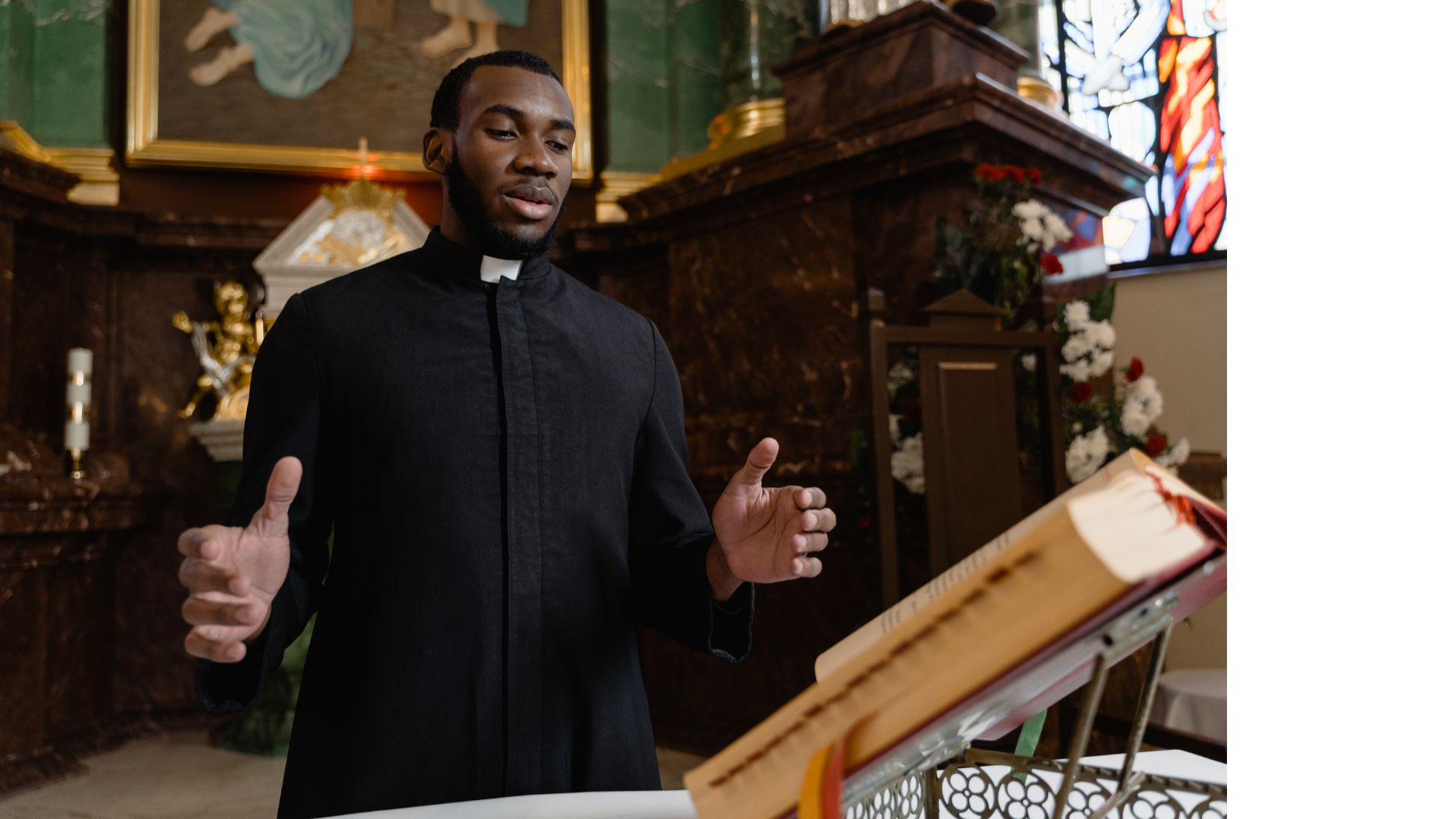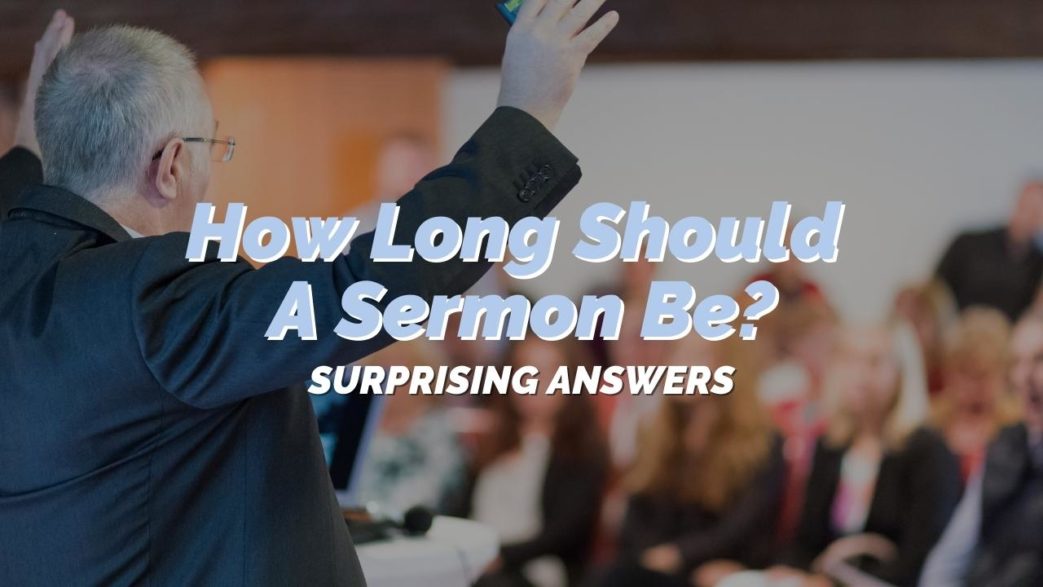There is no single answer to the question, “How long should a sermon be?” but it’s a common dilemma because people’s attention spans appear to be getting shorter.
So does this mean you need to cut down your sermon time? Or do you need to be more engaging? On the other hand, should people perhaps work on their patience and focus?
We’re going to dive into these questions and more. We’ll also share some interesting research about how long people think a sermon should be and how to adjust your sermon to be shorter or longer.
Estimated reading time: 14 minutes
Table of contents
How Long Can People Pay Attention?

How long do you want to be glued to your seat when listening to a talk? The general rule of thumb is that shorter is better. This is true for any form of speaking, whether it’s a keynote address, a stand-up comedy routine, or a school lecture.
The key question is: How long does it take to get your message across effectively while keeping your audience engaged?
According to John Medina in Brain Rules, the average attention span is about 10 minutes. Other research has echoed that students’ level of attention and engagement decreases rapidly about 10-15 minutes into a lecture.
In addition, TED talks have become wildly popular and are limited to 18 minutes. These concise lectures demand the audience’s attention for a short period while delivering an impactful message. TED also says some of their most successful talks have been as short as five minutes long.
Is Attention Span About Quantity or Quality?
According to an article on Inc.com, some of the best speeches in history were under 20 minutes. For example, Abraham Lincoln’s Gettysburg Address was 272 words, lasting two minutes, and Winston Churchill’s “Blood, Toil, Tears and Sweat” speech was a mere 688 words.
One could also argue that Jesus was not long-winded! He delivered his point, frequently through a parable, and then went on His way.
If shorter talks have been effective from a historical perspective, then that principle surely holds true today.
Some blame technology for shorter attention spans. Online videos and content have indeed become briefer over time. Nowadays, Instagram reels, TikTok videos, and YouTube shorts are frequently under five seconds.
But is popular content getting shorter because of peoples’ dwindling attention spans or because previous content was long-winded and filled with useless fluff?
In addition to short content, long-form podcasts still seem to be effective. For example, The Joe Rogan Experience is a widely popular podcast and averages two hours and thirty-five minutes per episode. It appears that people aren’t entirely uninterested in longer talks.
So what does this mean for your sermon? Is it about length, delivery, or all of the above?
Understanding Your Congregation
Understanding your congregation is super important, especially when it comes to how long your sermons should be. Public speaking isn’t just about the speaker, it’s about the audience too. You want to keep people interested and engaged.
To figure out the right length for your sermon, you need to know your congregation well. That means knowing who they are, what they like, and how they feel about listening to you talk about God. Some people might really enjoy longer sermons because they want to learn a lot. Others might prefer shorter ones because they have a shorter attention span.
It’s also a good idea to look at what other preachers are doing. They might have some ideas that work well with their congregation that you could try out.
Finding the optimal length for your sermon is like finding the perfect puzzle piece. You want it to fit just right into the bigger picture. If it’s too short, people might feel like they didn’t get enough. If it’s too long, they might start to tune out.
One tip is to look at the average age of your congregation. Older people tend to prefer longer sermons since many grew up in churches with 1 hour+ sermons. Younger people probably prefer shorter sermons, or at least sermons with more excitement and action.
Overall, understanding your congregation helps you give them the kind of sermon they’ll enjoy and get something out of. It’s like knowing what flavor of ice cream your friends like so you can bring the right one to the party. When you know your congregation well, you can be sure to give them a good sermon that they’ll remember.
How Long Should a Sermon Be?

Now that we’ve looked at general attention span, which is the length of time a person can concentrate mentally before becoming distracted, let’s turn more specifically to sermons and church services.
Sermons vs. Other Forms of Teaching/Speaking
Here are some unique points regarding how long a sermon should be:
- First, you are cultivating a spiritual atmosphere and the presence of God. We should all have a posture of reverence and honor when we come to hear the Word of God delivered by a trusted teacher.
- Second, sermons are typically delivered on a weekly basis. You have an opportunity each week to deliver your sermon and build on the overall message. Although each sermon should stand alone to an extent, it’s not a “one-and-done” situation.
- Finally, people attend church with the intention of hearing a sermon. They know what to expect and are there to learn and grow in their faith. Knowing this, having a “too short” sermon can be just as detrimental as “too long.”
Average Sermon Length
A sermon is typically anywhere from 20-40 minutes long, with some going over an hour. According to a 2017 National Association of Evangelicals (NAE) survey, the median sermon length was 30 minutes, with a range of 20-45 minutes. The median length for overall church service was 75 minutes with a range of 30-150 minutes.
Factors Influencing Sermon Length
When thinking about how long a sermon should be, pastors consider just a few things. First, they look at what God’s word says. In the New Testament, the Apostle Paul wrote letters of different lengths to different people. This shows that there isn’t just one right length for a sermon.
Sometimes, a short sermon works best. It’s like a quick punch of important information. Other times, a longer sermon helps explain things better. Pastors also think about their own style and what their congregation likes. Some people like short sermons because they’re easier to pay attention to. Others like longer sermons because they feel like they learn more.
Special occasions also matter. If it’s a holiday or a big event, the sermon might be shorter to fit with everything else going on. But if it’s a series of talks about something important, the sermons might be longer to cover everything well.
Overall, pastors want to make sure their sermons share God’s word in a way that people can understand and connect with. They learn from the Apostle Paul’s example and adapt their sermons to fit what’s best for their congregation. It’s about finding the right balance so everyone can grow in their faith together.
Who Decides How Long Should a Sermon Be?

Should the pastor or leadership team decide how long the sermon should be? Or is it up to the people? Hopefully, you can take the perspectives of both sides into account.
Churchgoers’ Perspective
According to a Lifeway study, the majority of churchgoers prefer a sermon between 20-40 minutes. They are twice as likely to say their pastor’s sermon is too long (27%) than that it’s too short (13%).
Here’s some more feedback:
- 27% prefer 20-30 minute sermons
- 25% prefer 30-40 minute sermons
- 14% prefer 15-20 minute sermons
- 9% prefer 40-50 minute sermons
On the extremes, there are also those who prefer a sub-15 minute sermon and those who want a message longer than one hour.
Pastors’ Perspective
Additional interesting data from this study shows that pastors and churchgoers have different perceptions of the length of the sermon. Among Protestant churches, 85% of pastors report that their sermons are less than 40 minutes, but only 66% of churchgoers say the same.
Church leaders should take note of this fact: pastors delivering sermons perceive time differently than those who are listening to the message!
Pastors are in a difficult position. They are responsible for delivering a biblical, Christ-centered sermon and edifying the body of Christ. Their first responsibility is to honor the Lord and deliver the message He is calling them to.
The goal is not to water down the Word of God, speed up biblical teaching, or cater to every whim of popular opinion. Pastors should help their people grow in maturity – and that includes cultivating patience, focus, and giving the Lord priority when it comes to their time.
At the same time, pastors need to acknowledge the line where sermons become “too long”, which will discourage people from attending church altogether.
Those who have a tendency to preach long also need to be completely honest about the following:
- Are you preaching long because the Holy Spirit is prompting you, or because you like to talk?
- Is there part of your ego that finds purpose and fulfillment based on time with a microphone?
- Are you rambling, or are you delivering valuable, focused content?
- Is your preaching longer because you’re ill-prepared?
These questions may be difficult to answer honestly. But they will ultimately ensure that you are not making excuses when it comes to preaching long, and your focus is on serving your members and accurate teaching.
Factors That Affect How Long a Sermon Should Be

As you saw in the survey results noted above, people have varying opinions on how long they’d like a sermon to be. There isn’t one consensus, so you must carefully weigh the following factors to determine the best sermon length for your church.
Expectations of how long a sermon should be are a blend of past and present assumptions, such as:
- Traditional sermon length within the denomination or congregation. How long have sermons been historically?
- How long do members expect church service to be given their current schedule and lifestyle?
- What is the length of the overall worship experience? How much time is allocated for the sermon compared to other elements of the service?
Some factors that affect sermon length are logistical.
For example, how many services do you have on the weekend, and how close together are the start times? You need to end your service with adequate time for everyone to exit the building, children’s classrooms, and parking lot. This ensures a smooth transition for your volunteers and the people arriving for the next service. For example, you probably need an hour or more between a Sunday morning and Sunday afternoon service in order to transition smoothly.
Another factor is what components are included in your service. The sermon is a vital part of the worship experience, but other elements, such as worship, are also powerful. You need to allow time for people to process their personal experiences with the Lord and each other.
Service elements in your church might include communion, time with prayer partners, or an additional worship song to conclude the service. However, the more you do, the shorter your sermon may need to be to accommodate everything.
Something else to consider is how your sermon will translate for an online audience. With an abundance of online content, people are also becoming accustomed to having the power to speed up a message or skip parts they find boring or slow. In general, people will be more likely to watch shorter sermons and services online than long ones.
Tips for Delivering Sermons

We’ve learned a lot about sermon length! Now, let’s jump into some tips for if you want to deliver shorter sermons or longer sermons. These tips should help you adjust the length of your sermons accordingly.
Remember: these are just helpful tips, they aren’t laws to live by. If one tip doesn’t work for you or your style of preaching, you don’t have to use it. These tips also won’t guarantee you’ll find that sweet spot you’re looking for. It may take some trial and error with your public speaking, and a few people may fall asleep every once and awhile, but don’t give up!
Tips for Delivering Short Sermons
Now that you understand some of the factors to consider when determining sermon length, perhaps you’ve realized your sermons need to be a little shorter. Here are a few tips for ensuring your message stays on time.
- Start with the end in mind. How do you want people to feel after your sermon? What is the key takeaway? Keep this goal in mind as you prepare so you can focus on what’s most important.
- Prepare well in advance. When you don’t take time to prepare, you’re more likely to go off on rabbit trails or be redundant. Practicing with a timer will also help ensure you stay on time.
- Don’t be afraid to edit. Once you start preparing, it can be easy to keep going and going. But that doesn’t mean everything must be included in the final sermon. Cut out anything that isn’t essential to your main point, or consider splitting the message or turning it into a sermon series.
- Be aware of your transitions and filler phrases. A good way to determine if your sermon is too long is to see how many times you say things like, “And that leads me to my next point.” If you find yourself doing this too often, it may be a sign that your sermon is getting long-winded.
- Consider your delivery. How you say something can be just as important as what you’re saying. Be aware of your tone, facial expressions, and body language.
Remember those short attention spans we talked about earlier? A key part of holding your audience’s attention is not just to preach a shorter sermon, but to make it more engaging. Practice and feedback will help you find the right tone and delivery over time.
Tips for Delivering Longer Sermons
What if you’re on the other end of the spectrum, and you can’t think of enough to say? Here are a few tips for filling out your sermon.
- Do your research. When you’re short on time, skipping research or focusing only on one source can be tempting. But in order to deliver a quality message, you need to back up your points with multiple sources.
- Take advantage of stories and illustrations. A good story can be more memorable than a list of facts. If you’re struggling to fill time, look for illustrations that reinforce your main points.
- Don’t be afraid to preach series. A sermon series is a great way to elaborate on one topic without trying to cram everything into a single message. This doesn’t mean shorter messages. Instead, it gives you the opportunity to go deeper into each point and explore its implications.
- Use props or multimedia. Sometimes, a visual aid can be helpful in driving home a point. Just be careful not to rely on them too much or use them as a crutch.
A Final Long Sermon Joke

We can’t help but end with a joke about a sermon that went a bit too long:
A pastor known for his lengthy sermons noticed a man get up and leave during the middle of his message. The man returned just before the conclusion of the service. Afterward, the pastor asked the man where he had gone.
“I went to get a haircut,” was the reply.
“But,” said the pastor, “why didn’t you do that before the service?”
“Because,” the gentleman said, “I didn’t need one then.”
All joking aside, we hope we’ve helped you in the process of answering the question: How long should a sermon be? Ultimately, you will have to prayerfully consider what God is calling you to do, what you’re hearing from church members you trust, and do what’s right for your unique church. Whether you’re a seasoned preacher or a bit rusty, we hope this was helpful.
How long are the sermons at your church? Leave a comment below and let us know!





Comments 3
Our sermons are between 30 and 40 minutes long.
Too many pastor’s repeat themselves as if those listening are not getting the message. It’s irritating.
This is the big one for me.
Not all pastor’s have the ability to keep one’s attention and the message gets lost.
No charisma.
We have a number of senior citizens whose concentration span is a lot less than than the younger people .
Many times one can get more out of a short message .
I think pastor’s feel because they are preaching once a week they have limited time to get their message across so its possible they preach too long.
Its interesting how when you first start preaching, you think “I don’t know how so and so preaches 40 minutes.” You think a sermon doesn’t need to be longer than 20. However, as the years go by, things change…
Author
So true. It was hard to do 30 minutes when I was 25. Now I fight be under 40.